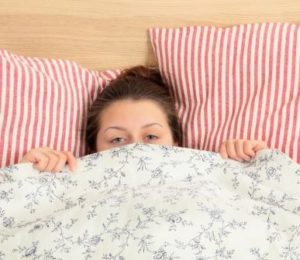
Teenagers who can’t get up in the morning are just plain lazy, right?
It’s a commonly held assumption, but not one shared by sleep researchers at Flinders University, who are actively challenging it as part of a world first clinical trial.
The new NHMRC-funded research is in response to increasing evidence that some people’s body clocks make it impossible for them to get enough sleep to wake up fresh the next day.
The trial, which is being conducted at Monash University, The Woolcock Institute of Medical Research and Flinders, has recruited more than 100 people who struggle to fall asleep and then find it difficult to wake up.
Its aim is to investigate whether melatonin, a natural hormone made by the pineal gland in the brain, can re-jig the body clock so that the person goes to sleep earlier.
Professor Shantha Rajaratnam, Deputy Head of the School of Psychological Sciences at Monash University, which is leading the study, said that insomnia affects 25% of the community and is often poorly diagnosed by doctors who simply prescribe sleeping tablets.
He said there might actually be no medical reason for these irregular sleep patterns and that they may be easily addressed with melatonin.
Flinders University’s Professor Leon Lack, who is leading the Adelaide part of the study, said DSPD affects a small proportion of people who would consider themselves insomniacs.
If you would like to be involved in the trial, the research team are still recruiting.
You may be eligible if you:
- are aged between 16 and 65 years
- work/study five or more consecutive days per week
- are willing to go to bed at a desired bed time for five or more nights per week
What will the project involve?
- monitoring of your sleep-wake behaviour (by completing a sleep diary and wearing a watch that measures your sleep behaviour)
- The collection of saliva samples
- Taking either melatonin or placebo for a 4-week period
- two x 30-minute consultations with a Sleep Physician
Participants will be reimbursed $50 for the time and inconvenience involved.
In order to assess suitability for the study all potential participants will undergo a pre-screening questionnaire which will take no longer than 30 minutes to complete.
If you are interested please click on the link.
If you are deemed suitable, you will be contacted by email.
Flinders University is also currently conducting a treatment study for individuals suffering from insomnia.
Researchers are looking for people who;
- Have difficulty falling and/or staying asleep
- Typically sleep between 11pm and 8am
- Are not taking any medications which may cause or affect sleepiness
- Consume less than 3 caffeinated beverages a day
- Consume less than 2 standard alcoholic drinks per day
- Are non-smokers aged between 18-80 years
- Have good spoken English
Successful applicants will receive treatment and be reimbursed $50 for their time.
The study will run for seven weeks with participants asked to fill out daily measures online and attend 3 group sessions with a trained psychologist who specialises in sleep.
If you are interested in participating, or would like more information please contact Lucy at grah0169@flinders.edu.au

